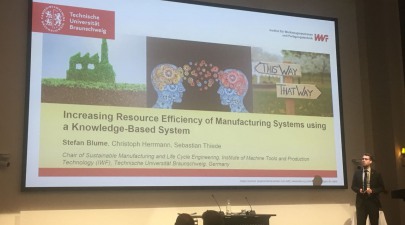
Today companies often implement sustainability strategies to react to changing market demands, and to reduce their environmental impact and resource related costs. However, finding the most optimal resource savings can be challenging. Depending on the experience and knowhow within the company, the possibility to find promising improvement measures varies so much that it can even remain undetected.
This is when knowledge-based systems can come into play, providing knowledge to support planners and decision-makers with the identification of the most effective measures to optimise the use of resources.
Knowledge-based system to improve sustainability
At the 25th CIRP Conference on Life Cycle Engineering in Copenhagen, Stefan Blume from the Technical University of Braunschweig (Germany) presented a methodology – basing on the Horizon 2020 research project MEMAN – that answers these challenges.
The methodology presents a knowledge-based system that is able to identify improvement measures at machine and process chain level through rule-based reasoning. To exploit these potentials, suitable improvement measures are assigned automatically from a knowledge database. The application of the methodology is demonstrated with a case from the metal mechanic industry.
The presented results perfectly matched the focus of this year’s CIRP Conference, which explored the role that engineering must play in the achievement of the UN Sustainable Development Goals.
The paper on “Increasing Resource Efficiency of Manufacturing Systems Using a Knowledge-Based System” presented at the CIRP Conference in Copenhagen is available on ScienceDirect with open access.
For more information, please contact:
Stefan Blume (Stefan.Blume@tu-braunschweig.de)
Valeria Mazzagatti (valeria.mazzagatti@greenovate.eu)